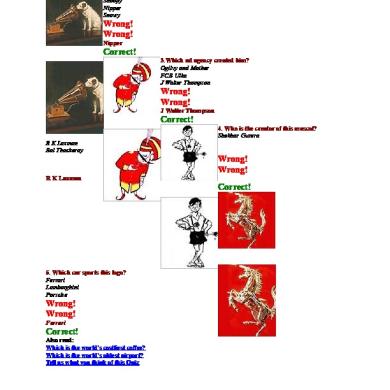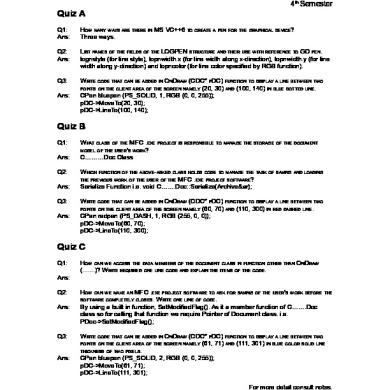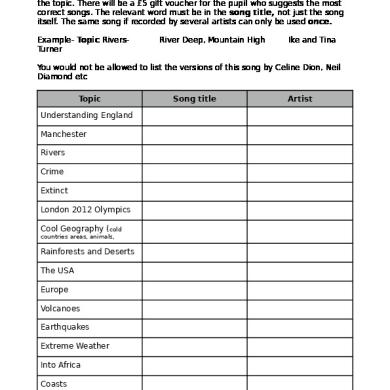Quiz # 2.docx
This document was uploaded by user and they confirmed that they have the permission to share it. If you are author or own the copyright of this book, please report to us by using this DMCA report form. Report DMCA
Overview
Download & View Quiz # 2.docx as PDF for free.
More details
- Words: 756
- Pages: 1
Quiz No. 2 / Taxation Law 2 / Atty. Vela
Quiz No. 2 / Taxation Law 2 / Atty. Vela
1. What actions of the CIR/BIR are considered deemed denial of a protest? 2. What are the grounds for constructive distraint? 3. Differentiate Distraint from levy. 4. What are the civil penalties in tax cases? 5. What are the elements tax evasion?
1. What actions of the CIR/BIR are considered deemed denial of a protest? 2. What are the grounds for constructive distraint? 3. Differentiate Distraint from levy. 4. What are the civil penalties in tax cases? 5. What are the elements tax evasion?
True or False. Write true if the statement is absolutely true. Otherwise, write why the statement is false. 1. An invalid waiver does not extend the prescriptive period. 2. Forfeiture of the taxpayer’s distrained or levied property, for lack of adequate bids cannot operate in satisfaction of the total tax claims even beyond the value of the property forfeited. 3. The claim of the government predicated on a tax lien is not superior to the claim of a private litigant predicated on a judgment. 4. The lien follows the property subject to the tax into the hands of a third party. 5. Collection of taxes cannot be restrained through an injunction. 6. The CIR cannot delegate the power to institute a civil case for collection of taxes. 7. Surcharges are not penalties but civil administrative sanctions. 8. The acquittal in the criminal case operates to discharge the accused from the duty to pay the tax. 9. The taxpayer’s failure to appeal to the CTA in due time does not make the assessment in question final, executory and demandable. 10. The timely service of a warrant of distraint or levy suspends the running of the period to collect the tax deficiency.
True or False. Write true if the statement is absolutely true. Otherwise, write why the statement is false. 1. An invalid waiver does not extend the prescriptive period. 2. Forfeiture of the taxpayer’s distrained or levied property, for lack of adequate bids cannot operate in satisfaction of the total tax claims even beyond the value of the property forfeited. 3. The claim of the government predicated on a tax lien is not superior to the claim of a private litigant predicated on a judgment. 4. The lien follows the property subject to the tax into the hands of a third party. 5. Collection of taxes cannot be restrained through an injunction. 6. The CIR cannot delegate the power to institute a civil case for collection of taxes. 7. Surcharges are not penalties but civil administrative sanctions. 8. The acquittal in the criminal case operates to discharge the accused from the duty to pay the tax. 9. The taxpayer’s failure to appeal to the CTA in due time does not make the assessment in question final, executory and demandable. 10. The timely service of a warrant of distraint or levy suspends the running of the period to collect the tax deficiency.
Quiz No. 2 / Taxation Law 2 / Atty. Vela 1. What actions of the CIR/BIR are considered deemed denial of a protest? 2. What are the grounds for constructive distraint? 3. Differentiate Distraint from levy. 4. What are the civil penalties in tax cases? 5. What are the elements tax evasion? True or False. Write true if the statement is absolutely true. Otherwise, write why the statement is false. 1. An invalid waiver does not extend the prescriptive period. 2. Forfeiture of the taxpayer’s distrained or levied property, for lack of adequate bids cannot operate in satisfaction of the total tax claims even beyond the value of the property forfeited. 3. The claim of the government predicated on a tax lien is not superior to the claim of a private litigant predicated on a judgment. 4. The lien follows the property subject to the tax into the hands of a third party. 5. Collection of taxes cannot be restrained through an injunction. 6. The CIR cannot delegate the power to institute a civil case for collection of taxes. 7. Surcharges are not penalties but civil administrative sanctions. 8. The acquittal in the criminal case operates to discharge the accused from the duty to pay the tax. 9. The taxpayer’s failure to appeal to the CTA in due time does not make the assessment in question final, executory and demandable. 10. The timely service of a warrant of distraint or levy suspends the running of the period to collect the tax deficiency.
Quiz No. 2 / Taxation Law 2 / Atty. Vela
1. What actions of the CIR/BIR are considered deemed denial of a protest? 2. What are the grounds for constructive distraint? 3. Differentiate Distraint from levy. 4. What are the civil penalties in tax cases? 5. What are the elements tax evasion?
1. What actions of the CIR/BIR are considered deemed denial of a protest? 2. What are the grounds for constructive distraint? 3. Differentiate Distraint from levy. 4. What are the civil penalties in tax cases? 5. What are the elements tax evasion?
True or False. Write true if the statement is absolutely true. Otherwise, write why the statement is false. 1. An invalid waiver does not extend the prescriptive period. 2. Forfeiture of the taxpayer’s distrained or levied property, for lack of adequate bids cannot operate in satisfaction of the total tax claims even beyond the value of the property forfeited. 3. The claim of the government predicated on a tax lien is not superior to the claim of a private litigant predicated on a judgment. 4. The lien follows the property subject to the tax into the hands of a third party. 5. Collection of taxes cannot be restrained through an injunction. 6. The CIR cannot delegate the power to institute a civil case for collection of taxes. 7. Surcharges are not penalties but civil administrative sanctions. 8. The acquittal in the criminal case operates to discharge the accused from the duty to pay the tax. 9. The taxpayer’s failure to appeal to the CTA in due time does not make the assessment in question final, executory and demandable. 10. The timely service of a warrant of distraint or levy suspends the running of the period to collect the tax deficiency.
True or False. Write true if the statement is absolutely true. Otherwise, write why the statement is false. 1. An invalid waiver does not extend the prescriptive period. 2. Forfeiture of the taxpayer’s distrained or levied property, for lack of adequate bids cannot operate in satisfaction of the total tax claims even beyond the value of the property forfeited. 3. The claim of the government predicated on a tax lien is not superior to the claim of a private litigant predicated on a judgment. 4. The lien follows the property subject to the tax into the hands of a third party. 5. Collection of taxes cannot be restrained through an injunction. 6. The CIR cannot delegate the power to institute a civil case for collection of taxes. 7. Surcharges are not penalties but civil administrative sanctions. 8. The acquittal in the criminal case operates to discharge the accused from the duty to pay the tax. 9. The taxpayer’s failure to appeal to the CTA in due time does not make the assessment in question final, executory and demandable. 10. The timely service of a warrant of distraint or levy suspends the running of the period to collect the tax deficiency.
Quiz No. 2 / Taxation Law 2 / Atty. Vela 1. What actions of the CIR/BIR are considered deemed denial of a protest? 2. What are the grounds for constructive distraint? 3. Differentiate Distraint from levy. 4. What are the civil penalties in tax cases? 5. What are the elements tax evasion? True or False. Write true if the statement is absolutely true. Otherwise, write why the statement is false. 1. An invalid waiver does not extend the prescriptive period. 2. Forfeiture of the taxpayer’s distrained or levied property, for lack of adequate bids cannot operate in satisfaction of the total tax claims even beyond the value of the property forfeited. 3. The claim of the government predicated on a tax lien is not superior to the claim of a private litigant predicated on a judgment. 4. The lien follows the property subject to the tax into the hands of a third party. 5. Collection of taxes cannot be restrained through an injunction. 6. The CIR cannot delegate the power to institute a civil case for collection of taxes. 7. Surcharges are not penalties but civil administrative sanctions. 8. The acquittal in the criminal case operates to discharge the accused from the duty to pay the tax. 9. The taxpayer’s failure to appeal to the CTA in due time does not make the assessment in question final, executory and demandable. 10. The timely service of a warrant of distraint or levy suspends the running of the period to collect the tax deficiency.
Related Documents

Quiz
November 2019 39
Quiz
May 2020 34
Quiz
November 2019 35
Quiz
May 2020 33
Quiz
October 2019 45
Quiz
November 2019 39More Documents from ""

Deed Of Donation Blank.docx
November 2019 27
Broccoli Bacon Salad.docx
November 2019 14
Quiz # 2.docx
November 2019 11
Ipl Case Ratio.docx
November 2019 12
Step By Step Menjadi Programmer Handal Dengan Vb.net 5
November 2019 58